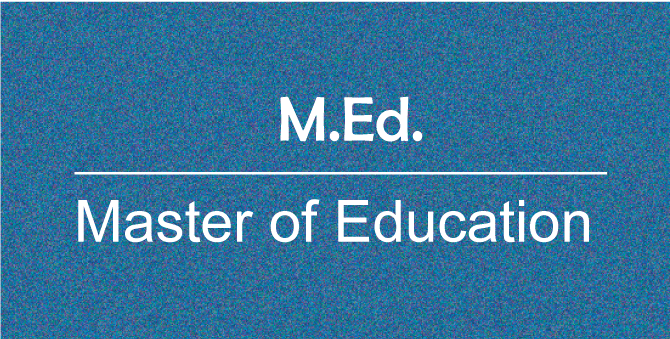What is the full form of M.EdM.Ed: Master of EducationM.Ed Stands for Master of Education. In teaching, training, and tutoring approaches, M.Ed is a postgraduate degree program given by numerous universities/institutions worldwide. It is usually a two-year course with four semesters. However, several colleges also offer one-year M.Ed programs. 
The Department of Higher Education, under the Ministry of Education, coordinates M.Ed. programs. It focuses on administration, school psychology, counseling, curriculum, and so on to provide the best education possible. Read for more information about M.Ed, its aims, kinds, eligibility, and admission. Goals for the M.Ed.With the National Council for Teacher Education's permission, launched the M.Ed program at the Department of Higher Education in 2006. (NCTE). The following reasons are given for the M.Ed foundation:
Types of M.EdThere are two methods to acquire an M.Ed. conventionally or via distance education. The type of M.Ed. For instance, the Karnataka State Open University and the Indira Gandhi National Open University (IGNOU) provide the M.Ed. via online education (KSOU). Organizations use the Jammu University Entrance Entrance Test, the Banaras Hindu University Postgraduate Entrance Test, and the Delhi University Entrance Test to give the standard M.Ed (JUET). Additionally, in certain schools, such as BHU, the M.Ed. and M.Ed. (special education) programs can only be completed in one year (two semesters). Qualifications for an M.Ed.Despite the two distinct delivery methods, the requirements for both regular and distance M.Ed programs are the same. The only distinction is that although direct admissions are possible for distance learning programs, popular entrance tests are required for admission to regular programs. To pursue an M.Ed., students must fulfill the following qualifications:
Process for Admission:There are two important admission processes in M.Ed.
Popular M.Ed Admission Exams:The following list includes the most popular M.Ed. admission exams:
M.Ed. Specialization Courses:The advanced study of a particular topic within that field is what the specialization courses cover. These programs are quite well-liked right now. Due to their ability to focus on one area of study, students with specialization can create a curriculum that interests them. A student's professional abilities and leadership qualities are enhanced as a result. These are a few of the M.Ed. specialization courses:
M.Ed Benefits and Purpose:Students might secure a prospective government teaching position through the M.Ed degree. It includes a range of study topics and specializations. The following list of benefits and program scope for the M.Ed. Benefits of M.Ed
Students who have earned a master's degree in education can pursue successful careers as educators or researchers by pursuing a Ph.D. Given that M.Ed courses strongly focus on communication abilities, they can also choose to be speakers in other professions. Following are a few career options for M.Ed. students: Online teacher:
Teacher at school:
Researcher:
A home tutor:
M.Ed. Top Recruiters:Top employers of M.Ed. candidates include:
The Conclusion:This information will help in your knowledge of M.Ed. Full form and about their benefits and also Process for Admission. FAQs about M.Ed.Question 1: What is M.Ed.'s full name? Answer: A master of education is the full form of an M.Ed Question 2: What are the most well-known M.Ed. exams? Answer: DUET, JUET, BHU PET, MEET, etc., are the most well-liked M.Ed. examinations. Question 3: Who is qualified to apply for an M.Ed.? Answer: Candidates for the M.Ed. program must hold a B.Ed. from an approved board of education or university with a minimum cumulative grade point average of 50% (or 60% in some institutions). Question 4: What specialization programs does the M.Ed. offer? Answer: The following disciplines are offered as M.Ed specialization courses: educational technology, Guidance, counseling, rural education, women's studies, environmental education, etc.
Next TopicFull Form Lists
|
 For Videos Join Our Youtube Channel: Join Now
For Videos Join Our Youtube Channel: Join Now
Feedback
- Send your Feedback to [email protected]
Help Others, Please Share










